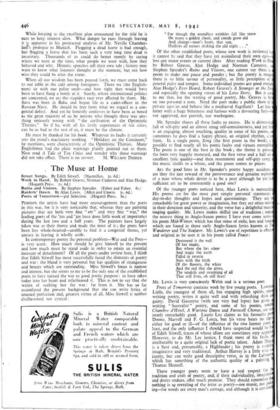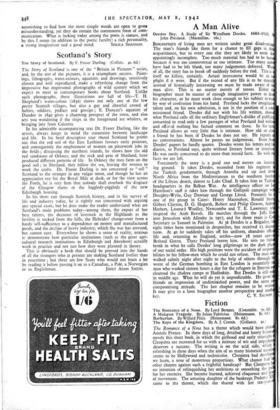The Muse at Home
Street Songs. By Edith Sitwell. (Macmillan. 3s. 6d.)
Work in Hand. By Robert Graves, Norman Cameron and Alan Hodge. (Hogarth Press. 2s. 6d.)
Ruins and Visions. By Stephen Spender. (Faber and Faber. 6s.) Raiders' Dawn. By Alun Lewis. (Allen and Unwin. 3s. 6d.) Poets of Tomorrow-3rd Selection. (Hogarth Press. 6s.) PERHAPS the artists have had more encouragement than the poets in this war, for it is very noticeable that, whereas they are painting pictures that are both very fine " art " and very fine "war," the leading poets of the '20s and '30s have done little work of importance during the last two and a half years. The painters have largely taken war as their theme and made the most of it ; the poets have been less whole-hearted—unable to find it a congenial theme, yet uneasy in leaving it wholly aside.
In contemporary poetry the personal problem—War and the Poet— is very acute. How much should he give himself to the present and how much must he stand aside in order to retain an essential measure of detachment? Of all the poets .under review here, I think that Edith Sitwell has most successfully fused the elements of poetry and war : the blend is very personal but has qualities of strangeness and beauty which are outstanding. Miss Sitwell's focus is narrow and intense, but she seems to me to be the only one of the established poets to have turned the war to good poetic purpose : to have taken today into her heart and refashioned it. This is not to say that she writes of nothing but the war : far from it. She has so far assimilated the present background that she can write lyrics of unusual perfection and, greatest virtue of all, Miss Sitwell is neither disillusioned nor cynical : "For though the soundless wrinkles fall like snow On many a golden cheek, and creeds grow old And change—man's heart, that sun, Outlives all terrors shaking the old night . . ."
Of the other established poets, whose new work is reviewed Ii it cannot be said that they have yet assimilated their own egos less any major events or current ideas After reading Work in H by Robert Graves, Alan Hodge and Norman Cameron, Stephen Spender's Ruins and Visions, one cannot say there is poem to make one pause and ponder ; but the poetry is meag there is so little savour of personality, so little perception of general pulse and temper. Some individual poems are good enoug AlanHodge's Ever Heard, Robert Graves's A Stranger at the P and especially the opening verses of his Love Story. But it see to me that, for the writing of good poetry, Mr. Graves is bin on too personal a note. Need the poet make a public show of private agois:es and behave like a mediaeval flagellant? Let him bitter with a huge bitterness and furious with a devouring fury—e not aggrieved, nor peevish, nor woebegone.
Mr. Spender shares all these faults to excess. He is distressing full of self-pity and an almost smug self-consciousness, and yet the is an engaging, almost touching, quality in some of his poems, sometimes he does find a happy phrase, an original rhythm, a n: form. In a single poem, Song (the first poem in the book), ii possible to find nearly all his poetic faults and virtues exemplifie The poem is one of the best in the book ; the theme is person the form very happily managed, and the first verse and a half are excellent lyric quality—and then resentment and self-pity creep the music shrills to a whine, and the poem comes to pieces.
Are the good lines in Mr. Spender's poetry happy accidents are they the just reward of the perseverance and genuine aspirat of a man whose whole desire is to be a poet although he yet la,. sufficient art to be consistently a good one?
Of the younger poets noticed here, Alun Lewis is outstanchn .His poems are for the most part simple personal statements day-to-day thoughts and hopes and questionings. They are n remarkable for great power or imagination, but they are often mon in their direction and sincerity, and the verse has a delightful musiL singing quality. Mr. Lewis makes skilful use of tradition ; inde the nearest thing to Anglo-Saxonpoetry 1 have ever come acres.) his poem Mid-Winter: which has that sense of exile; loss and Imp which are found in those early Anglo-Saxon lyrics known as T Wanderer and The Seafarer. Mr. Lewis's use of repetition is effect: and original as he uses it in his poem called Peace:
Destroyed is the well Of her magic, But where she lies silent And tragic the earth Pallid in reverie Stirs with the birth Of the flowers the white
And the red that she gives,
The tendrils and swarming of all
That still lives, oh still lives!
Mr. Lewis is very consciously Welsh and is a serious poet.
Poets of Tomorrow contains work by five young poets. Lawr Little, the youngest of them all, has engaging high spirits, enjo writing poetry, writes it quite well and with refreshing dash gaiety. David Gascoyne (with one very bad lapse) has given writing " Surrealist " poetry, and some of his poems, riots Chambre d'Hotel, A Wartime Dawn and Farewell Chorus, are nearly remarkably good. Laurie Lee claims as his favourite Donne, Marvell and F. G. Lorca, but his verse bears no sign either for good or the influence of the two former poets least, and the only influence I should have suspected would be di of Edith Sitwell, traces of whose idiom are sometimes very aPPare However, to do Mr. Lee justice, I think most of his faults attributable to a quite original lack of poetic talent. Adam Drin
is a Scot and, presumably, a Highlander ; his
poetry is readab imaginative and very traditional. Arthur Harvey is a little trite a jaunty, but can write good descriptive verse, as in the Labour which has something of the authentic quality of a • painting Thomas Hermell.
These younger poets seem to have a real respect for
tradition and craft of poetry, and; if their individuality, urtagina and desire endure offer much promise. They should remember nothing isso revgding of the artist as poetry—not music, not mg—for words are every man's coinage, and although it is cons astonishing to find how the most simple words are open to gross misunderstanding, yet they do remain the commonest form of communication. What is lacking today among the poets is stature, and by this I mean (in addition to the poetic faculty) a rich personality, a strong imagination and a good mind. SHEILA SHANNON.























 Previous page
Previous page